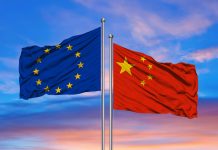-Visits the Artillery Centre
-Says Army to modernize Artillery Corps
RAWALPINDI: British High Commissioner to Pakistan Christian Turner on Friday called on Chief of Army Staff (COAS) General Qamar Javed Bajwa here at General Headquarters in Rawalpindi, said Inter-Services Public Relations (ISPR).
According to the military’s media wing, matters of mutual interest, regional security situation including the recent developments in Afghan peace process and collaboration in fight against COVID-19 were discussed in the meeting. During the meeting, the army chief said, “Pakistan values UK’s balanced role in global and regional affairs and we look forward to optimize strategic potential of our relationship based on convergences.”
The visiting dignitary acknowledged Pakistan’s continuous efforts for peace and stability in the region and pledged to further enhance bilateral relations between both the countries, said ISPR.
Earlier on February 12, Mr. Turner had called on Army Chief at GHQ. Matters of mutual interest, the Afghan peace process, overall security situation, and other issues had been discussed in the meeting. During the meeting, the army chief had thanked the British government for its support to Pakistan in fight against the coronavirus pandemic.
Meanwhile on Friday, ISPR said in another statement COAS has visited the Artillery Centre where he interacted with officers and troops. COAS General Qamar Javed Bajwa installed Lieutenant General Muhammad Abdul Aziz, Commander 4 Corps as Colonel Commandant of Artillery Corps.
Outgoing Colonel Commandant of Artillery Corps Lieutenant General Retired Humayun Aziz, a large number of serving and retired officers and soldiers attended the ceremony. While interacting with officers and troops, the army chief appreciated the artillery corps for displaying the highest standards in all professional pursuits, including their exemplary performance in operations. He also said that Pakistan Army would do all that is possible to modernise the Corps of Artillery as part of its overall drive to prepare for the future threat.–ISPR




